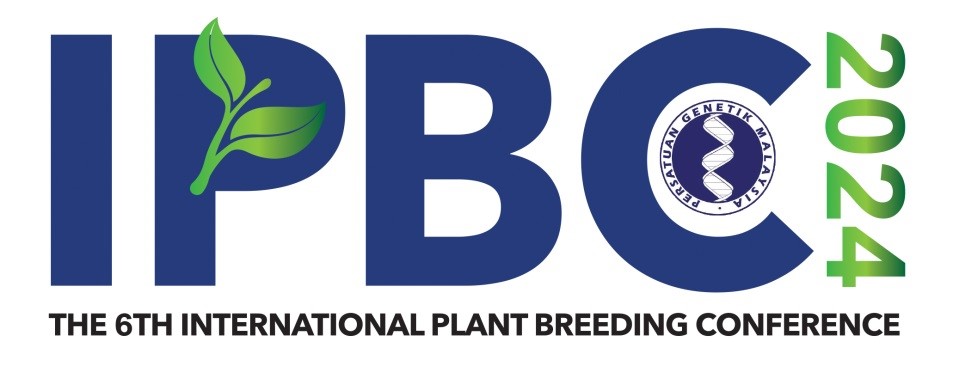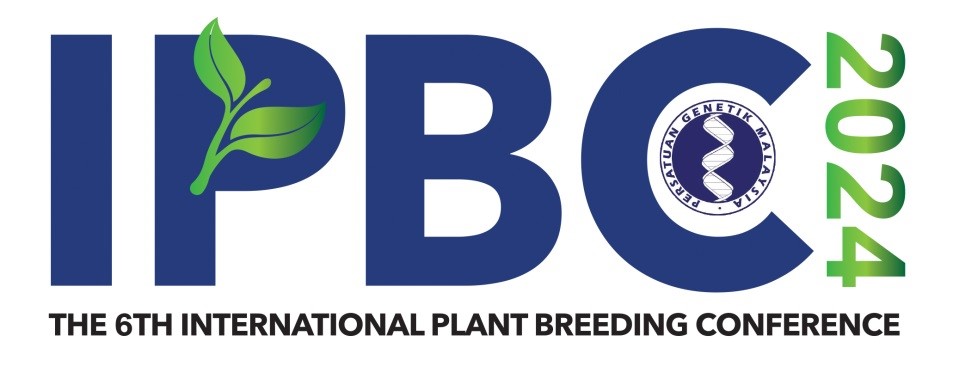REGISTRATION AND SUBMISSION
for

5 - 7 March 2024
Bangi Resort Hotel, Selangor, Malaysia
Physical & Online
BACKGROUND
Plant breeding is an essential field of research aimed at improving the yield and quality of plant production, with far-reaching impacts on economic and national development. The achievements of plant breeding have been tremendous, and advancements in techniques and tools continue to assist breeders in their selection practices and strategies for plant improvement. The upcoming Plant Breeding Conference, organized by the Genetics Society of Malaysia, marks the sixth edition of this esteemed series that began in 2012. Building upon the overwhelming success of the previous conferences, this sixth conference takes on a larger role in accelerating synergies in plant breeding and genetics, particularly focusing on innovations in plant breeding for global sustainability. Over the course of two days, distinguished speakers from various disciplines will present their views and findings, highlighting the latest advances and achievements in plant breeding activities. With more than 15 invited speakers, the conference provides a unique opportunity for plant breeders, agricultural scientists, geneticists, researchers, academicians, biotechnologists, and students to come together and share their knowledge, experiences, and successful endeavors in plant improvement programs. By addressing innovations in plant breeding for global sustainability, the conference aims to contribute to the development of sustainable agricultural practices that support food security and environmental well-being. Additionally, a one-day educational trip is scheduled to further enrich the learning experience and provide valuable insights into practical applications of plant breeding.
THEME
Innovations in Plant Breeding for Global Sustainability
Plant breeding is an important tool in promoting global food security, and provide consistent high-quality crops that can better cope with evolving abiotic (e.g., climate) and biotic (i.e., diseases, insect pests) stresses. A changing climate conditions, a growing global population, and finite arable land create a critical challenge to produce an adequate food sustainability. Plant breeding innovations create a spectrum of agricultural innovation from old-fashioned plant breeding to cutting edge gene editing to achieve the desired outcomes for health, nutrition, safety, and environmental sustainability. This conference will cover innovation tools used in various aspects of plant breeding (Pre-breeding strategies, conventional breeding and modern breeding) in crop improvement for global sustainable production efforts to tackle hunger, poverty, waste, pollution, and climate change which aligned with Sustainable Development Goals (SDGs).
ORGANISER
Persatuan Genetik Malaysia (Genetics Society of Malaysia) and Malaysian Agricultural Research and Development Institute (MARDI)
CONFERENCE MANAGER
WMIT Group Sdn Bhd
NORMAN BORLAUG LECTURE
PROF. WALLACE A. COWLING
The UWA Institute of Agriculture
The University of Western Australia
INVITED SPEAKERS
DR. HASE YOSHIRO
National Institutes for Quantum Science and Technology (QST-Takasaki), Japan
DR. FETRINA OKTAVIA
Indonesian Rubber Research Institute, Indonesia
PROF. BYOUNG-CHEORL KANG
Seoul National University, Republic of Korea
MR. PAUL WARBURTON
BFC Research and Development Sdn. Bhd., Malaysia
DR. DEREK W. BARCHENGER
World Vegetable Center, Taiwan
DR. KENNETH MC NELLY
IRIC International Rice Informatics Consortium, Philippines
MR. FU JIQIN
Enza Zaden Asia Sdn. Bhd., Malaysia
PROF. PENG WAH CHEE
University of Georgia, USA
DR. MOHAMAD BAHAGIA BIN AB. GHAFFAR
Pusat Tanaman Industri, MARDI Seberang Perai
TS. DR. NUR FATIHAH HASAN NUDIN
Fakulti Biosumber dan Industri Makanan, Universiti Sultan Zainal Abidin, Terengganu, Malaysia
DR. RAJINDER SINGH A/L HARMINDER SINGH
Malaysian Palm Oil Board
MR. SAKTHIVEL PORAYA
Green World Genetics Sdn. Bhd., Malaysia
DR. NURUL HIDAYAH BINTI SAMSULRIZAL
International Islamic University Malaysia,
Malaysia
CALL FOR PAPERS
The Conference cordially invites academics, practitioners, scholars, researchers, policy makers of any government agencies to present their oral or poster papers in IPBC2024. Please register and submit your abstract via online to http://submit.confbay.com/conf/ipbc2024. All submitted papers will be blind reviewed by our scientific reviewers. Authors of accepted abstracts are required to submit a full paper consisting of a paper title, author(s) list, address and e-mail, abstract, introduction, methodology, results and discussion, conclusion, acknowledgement and references. The manuscript should be prepared using Times New Roman with font size 12. The manuscript should be written in not more than 15 pages, single-spaced including tables and figures. To expose our young minds to scientific cultures, we encourage the participation from postgraduate students all over the world to present their research projects in this Conference with their registration fee discounted.
WHO SHOULD ATTEND
Geneticists
Breeders
Biotechnologists
Industries
Academicians
Researchers
Agriculturists
Companies
Graduate Students
Enthusiasts
General
Public
For Details & Registration: http://submit.confbay.com/conf/ipbc2024
Further Information: https://www.pgm-my.org/event/ipbc2024
CONFERENCE TRACK
Pre-Breeding Strategies
Pre-breeding aims to broaden genetic base, improve stress tolerance, disease resistance and overall, plant performance. It includes activities that increase the efficiency and effectiveness of breeding programs, involving utilization of diverse genetic resources and techniques to identify and harness desirable traits from wild or unadapted plant species. These strategies enable the development of superior parental lines and facilitate the subsequent breeding of improved cultivars with enhanced genetic potential.
Conventional Plant Breeding
Conventional plant breeding involves manipulating the genetic makeup of the plants. Techniques such as selection, backcrossing, single-seed descent, and pedigree are approaches that have been employed to produce superior plant varieties with desirable traits. This innovation continues to be significant because it is highly accepted by seed producers, growers, and consumers, which therefore, increases the production of agricultural products and contributes to global sustainability.
Modern Plant Breeding
Molecular breeding offers a remarkable opportunity to tackle the variability and uncertainties in agri-food production while fostering an innovation- and knowledge-based economy. Recent breakthroughs in molecular markers, gene editing, genome selection, targeted mutagenesis, and precision agriculture technologies provide a robust platform for enhancing productivity, efficiency, and sustainability in agriculture. These advancements not only contribute to food security, support rural livelihoods, and mitigate environmental impacts but also hold immense potential for achieving global sustainability goals. By harnessing the power of molecular breeding, we can pave the way for a more sustainable future, ensuring the well-being of both present and future generations.
PAPER SUBMISSION GUIDELINES
Specific Instructions to Authors
Margin Manuscripts must be in single spacing, font size 12 in Times New Roman and all margins: 1.5 inches (left) and 1 inch (top, right and bottom).
Length Manuscripts are maximum 15 pages (including references, attachments, tables and graphical information).
Tables must be placed as part of the text. DO NOT attach tables at the end of the manuscript.
Software Manuscript must be submitted in MS Word form ONLY.
Title Written in uppercase, bold, size 14 and centered.
Author/s Name, address, email and contact number of all authors, font 12, Times New Roman.
Abstract between 250-350 words Times New Roman size 12.
Keywords should not more than FIVE keywords.
Title/sub-title Written in uppercase, bold, size 12 and left margin.
Tables/ Figures title of the tables/figure should be written on the top of the tables/figure. Times New Roman, font 12, Bold, lower case, centered.
Reference Should be in the last part of the article (before any attachments/appendixes), in alphabetical order, according to American Psychological Association (APA) style.
Link for download sample paper Download Sample Paper
Publication opportunity:
Food Research, Scopus Indexed Journal
E-ISSN 2550-2166
Malaysian Journal of Genetics (MJG), MyJurnal indexed
ISSN 978-967-14943, E-ISSN 978-967-14943
Transactions of PGM (tPGM) with ISBN
CPD Points:
Eligible for CPD points from Malaysian Board of Technologist (MBOT)
Conference Venue:
Bangi Resort Hotel
Off Persiaran Bandar,
43650 Bandar Baru Bangi,
Selangor, Malaysia
Tel: +603 8210 2222
Email: info@bangiresorthotel.com
Web: www.bangiresorthotel.com
GPS Coordinate:
2.955295, 101.765403
REGISTRATION AND SUBMISSION TIPS
1. Registration and submission of abstract, poster, full paper/camera-ready must be done electronically through the online submission system.
2. For First time user, click on the "Registration" menu to create ConfBay Account, and proceed for conference registration by logging in the system. For existing ConfBay user, proceed Login.
3. You must enter a valid email address. All notification will be sent via registered email.
4. If you wish to make submission, please register as "Presenter".
5. Click on "Online Submission" menu to submit your full paper / manuscript, and follow the procedure.
6. Before you proceed to register online, please ensure readiness of the following necessary documents:-
a. For Student - Scanned Copy of Student ID
b. For PGM Member - Please key in your Membership No.
c. Manuscript - Abstract / Full Paper
NORMAN BORLAUG LECTURE
Prof. Dr. Richard Visser
Wageningen University and
Research, Netherlands
TBD
PLENARY SPEAKERS
Prof. Dr. Daniel Tan Kean
Yuen
University of Sydney,
Australia
Pre-Breeding Methods for Heat Tolerant Cotton and Okra
Prof. Nigel Maxted
University of Birmingham,
United Kingdom
How to Double the Genetic Diversity Available to Breeders
Prof. Dr. Richard M
Trethowan
University of Sydney, Australia
Experiences from Trait Focused Pre-Breeding
Dr. B P Mallikarjuna
Swamy
International Rice
Research Institute, Philippines
Nutritional Improvement of Rice
Prof. Dr. Rony Swennen
International Institute
of Tropical Agriculture, Nigeria
Accelerated Breeding and Delivering Plantain and Cooking (Matooke and Mchare)
Banana Hybrids for Africa and Contributions from Asia
Prof. Dr. Paul Arens
Wageningen University and
Research, Netherlands
Developments within Genetics and Genomics of Ornamental Plants: Breeding
in Ornamentals is Coming of Age
